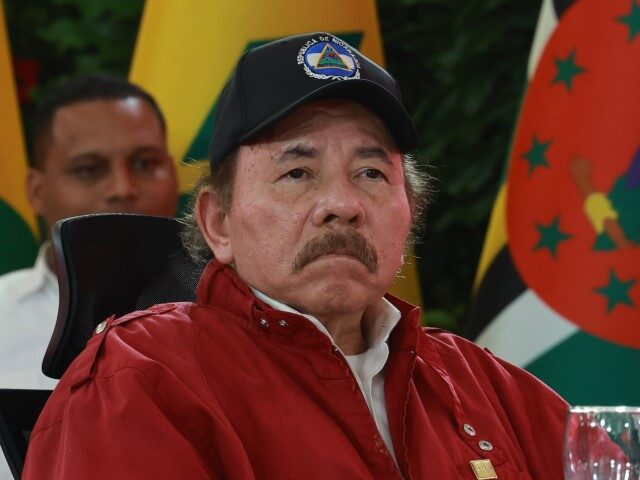The United Nations Group of Human Rights Experts on Nicaragua (GHREN) revealed in a report published this week that the communist Ortega regime banned nearly 8,000 Catholic processions between 2023 and 2024.
The silencing of traditional Catholic ceremonies occurred as part of dictator Daniel Ortega’s brutal campaign of repression against Christianity in the country.
The report also warned that the Ortega regime engaged in both physical and mental torture and cruel, inhumane, and degrading treatment of imprisoned Catholic priests and other religious figures during their unjust imprisonment in local prisons, including forced nudity and deliberately reducing the amount of food provided.
GHREN, established in 2022, was tasked by the United Nations’ Human Rights Council (HRC) with investigating the Ortega regime’s gross human rights violations since the events of April 2018, when thousands of Nicaraguans flocked to the streets calling for an end to communism in their country. The group must also make recommendations based on its findings “with a view to improving the situation of human rights” and providing “guidance on access to justice and accountability.”
GHREN’s report, presented on Monday, covers the widespread systematic violations of human rights and abuses of international law committed by the Ortega regime against the Nicaraguan Catholic Church between April 2018 and May 31, 2024.
The majority of Nicaraguans are Catholic. Close to half — 44.9 percent — identify as Roman Catholic, and 38.2 percent identify as evangelical Christian. Another 2.4 percent identify as practitioners of other religions.
Ortega, who identifies as Catholic, has waged a brutal persecution campaign against the Nicaraguan Catholic Church since April 2018 as punishment for the local Catholic Church’s support of the pro-democracy dissidents. In recent years he has expanded persecution to other groups of Christians, particularly Evangelicals.
GHREN detailed that, since 2018, the government “has been implementing a discriminatory plan in order to eliminate all critical voices and any threat to state control” and stressed that some of the violations constitute “the crimes against humanity of imprisonment, torture, deportation and persecution on political grounds.”
The persecution against Catholicism — which dramatically intensified between 2022 and 2023 — has resulted in pro-Sandinista thugs carrying out violent assaults against Catholic churches, the forced imprisonment and banishment of Catholic priests, and the banishment of nuns and other members of the Church, as well as the prohibition of the celebration of numerous Catholic processions and traditional Catholic festivities, some of which are unique to Nicaragua.
Ortega’s repression of Catholicism has also included the forced closure of Catholic media outlets in the country and the seizure of assets that belonged to the local Catholic Church, such as local bank accounts and Catholic-led universities. Ortega’s regime has also arrested journalists who cover their local communities’ processions and sentenced them to prison on charges of spreading “fake news.”
The report confirmed the prohibition of at least 7,976 Catholic processions in Nicaragua between 2023 and 2024. GHREN pointed out that the number of banned processions “could be higher,” as activities planned to be carried out in rural parishes or communities were not included in the tally.
The U.N. body estimated that the widespread ban of religious practices common to the largest group of faith in the country may have affected the religious freedom and other related rights of more than three million people, noting that not only those who profess Catholicism attend the processions. The Group of Experts pointed out that it had not recorded similar aggressions against non-Christian religious denominations.
GHREN concluded that it had “reasonable grounds” to believe that, in some cases, treatment of political prisoners “reached the threshold of torture due to its combination, prolonged nature, the presence of other stressors or vulnerabilities and the severe psychological and physical damage it inflicted on the victims.”
The experts explained:
These acts include long interrogations; threats; forced nudity; prohibition of communication with other detainees; inadequate food, in some cases in smaller portions than those corresponding to common prisoners; continuous artificial light; and conditions of constant isolation and incommunicado detention.
GHREN warned that the violations committed by the Ortega regime “succeeded in suppressing, in the long term, any critical and organized voice of the clergy, parishioners or lay people in Nicaragua.”
The group asserted:
The persecution of members of the Catholic Church and other Christian denominations also violated the right of thousands of people to freely and publicly practice their right to freedom of religion, with effects on other rights such as freedom of conscience, expression and opinion.
In November, members of the Nicaraguan Catholic Church participated in a U.S. Congressional hearing where they recounted their experiences of being tortured, brutalized, blackmailed, and repressed by the Ortega regime.
Some of the participants, who remained anonymous out of fear of possible repercussions against their families, told of their harrowing experiences of being kidnapped by Nicaraguan police, who accused them of being part of an “organized crime gang” and of “undermining” the Nicaraguan state for being part of the Catholic Church.
Christian K. Caruzo is a Venezuelan writer and documents life under socialism. You can follow him on Twitter here.

COMMENTS
Please let us know if you're having issues with commenting.